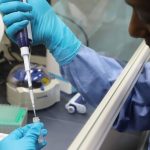Clive Landis | Agility and alignment: UWI research and innovation deployed in response to COVID-19

In answering the question on vaccine development posed by the editorial, it is important to understand that today’s recombinant vaccine technology requires constant investment by the State to build capacity in molecular technology, genetics and artificial intelligence, as well as private sector investment to build out the pharmaceutical and biotechnology sectors.
The countries leading the race to generate a vaccine against COVID-19 invest a minimum of 1.5 per cent of their national budget each year on research and are complemented by well-established pharmaceutical sectors. Among the Caribbean states, only Cuba has shown long-term investment in these sectors and is able to participate in primary vaccine research. But even Cuba is struggling to keep pace with the breakneck speed of vaccine development for COVID-19, which is harnessing artificial intelligence and molecular shortcuts to compress the time frame for vaccine development —including clinical trials, regulatory approval and manufacturing — to approximately one year.
That said, the editorial, in asking whether researchers in Jamaica and other parts of the Caribbean are working towards developing a vaccine, or other forms of antiviral treatment, makes two important observations. The first is that the UWI participates in world-class medical and scientific research, and second, that the region (i.e., greater Latin America and Caribbean region) holds a very tiny proportion of the world’s patents.
TRIPLE A STRATEGY
This speaks to two aspects of the Caribbean reality. The spark of genius and creativity flows strongly through the Caribbean character, and in the case of the UWI’s researchers, manifests itself in the creation of new knowledge and publications in scholarly journals that has propelled the University into top global university rankings. However, between the spark of an idea and a product being brought to market lies an entrepreneurial ecosystem that is largely missing in the Caribbean. Cognisant that this entrepreneurial ecosystem can certainly be built, this is the focus of intense work within various research and innovation divisions across the UWI system, as it builds the ‘Alignment’ pillar of the University’s Triple A Strategy (Five-Year Strategic Plan).
This alignment pillar seeks to deepen the relationship with industry and the private sector with measurable targets: such as creating eight spin-off companies and registering four patents over the five-year lifespan of the plan. The university has irrevocably shifted its outlook towards becoming an entrepreneurial university, and the recent COVID-19 pandemic has merely accelerated that process as we use our ingenuity to move our administrative processes, teaching and examinations online.
The university has leveraged its research expertise immediately to assist the Caribbean in its response to COVID-19, in keeping with the ‘Agility’ pillar of the strategic plan. It should be noted that the moral commitment of the UWI to assist the Caribbean community in the face of a regional emergency is in the DNA of the institution, and predates the Triple A Strategy.
Three research projects serve to illustrate this commitment, coordinated out of UWI campuses in Trinidad and Tobago, Jamaica and Barbados, respectively. One, at the behest of the Government of Trinidad and Tobago, has already been completed – an expert review conducted by the Faculty of Medical Sciences at the St Augustine Campus on the evidence base for the use of drugs for the management of COVID-19.
SOLIDARITY TRIAL
A second, led by the Mona Campus’ Faculty of Medical Sciences, is coordinating regional participation by the UWI in the World Health Organization’s ‘Solidarity Trial’, a global clinical trial to investigate the efficacy of potential drugs for the treatment of COVID-19. And finally, a data analytics project from the George Alleyne Chronic Disease Research Centre, at the Cave Hill Campus, is modelling the expected impact of the epidemic in collaboration with the region’s Disaster and Emergency Risk Management Agency, CDEMA, to estimate peak demand for acute hospital and critical care beds for Caribbean countries. There are also novel simulations being carried out on the economic and social impact wrought by COVID-19 on Caribbean societies, but these run outside the scope of this article on medical research.
The UWI is, hence, actively engaged in COVID-19 research which, through national ministries and regional partner agencies, is aimed at mitigating the clinical impact of COVID-19 during the outbreak phase. As with previous epidemics, such as the Zika epidemic, the benefits of research and partnership building are only fully recognised for the next epidemic.
LAB TESTING
We are seeing some of the benefits of these partnerships with the establishment of high-quality laboratory testing in at least eight Caribbean countries, the highest level of laboratory preparedness seen for a viral epidemic affecting the region. The National Influenza Centre at the UWI, Mona, leads the way again, delivering COVID-19 testing for the Ministry of Health & Wellness, Jamaica, in the national effort. Data generated from testing informs the Ministry of Health and Wellness on social distancing and other strategies to flatten the curve of the COVID-19 epidemic. The University will always play its role in the acute response of the Caribbean to a natural disaster or pandemic, as well as the steady process of capacity building with CDEMA, The Caribbean Public Health Agency, and other regional partners to strengthen disaster preparedness.
Students have also made their mark in the UWI’s COVID-19 response, including the placement of final-year medical students to manage call centres for the Government of Jamaica and provide sound medical advice to the public. Additionally, more than 100 of the UWI St Augustine’s District Health Visiting programme students have been assigned to do contact tracing for the outbreak in Trinidad and Tobago.
As the epidemic evolves, the UWI COVID-19 Task Force will continue to provide updates and reliable information for the public through its website ( www.uwi.edu/covid19) and the UWItv channels. The UWI continues to deploy its full expertise to help our Caribbean communities and is confident that “together we will get through this”.
Professor Clive Landis is chairman of The UWI COVID-19 Task Force. Send feedback to columns@gleanerjm.com.
Reprinted from the Jamaica Gleaner
Source: CARICOM TODAY

 Previous Post
Previous Post Next Post
Next Post